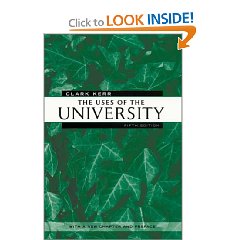The author is alarmed by the possibilities that universities, which were nurtured by post-World War II federal funding and state funding that is now vanishing, could begin to fail in almost catastrophic terms. Between aging and unrepentent faculty, the vanishing of liberal arts (or even quality education) for undergraduates, and the prostitution of graduate education to commercial purposes, there does appear to be a crisis.
After noting that America appears to spend more on prisons than on universities, the author makes several recommendations, all of which appear sensible. They include a new emphasis on university support to primary and secondary education, a rationalization of information technology within communities to better link businesses with members of the university family, the exploration of distance learning alternatives (as much to reach the drop-outs inexpensively as for any other reason), and the resurrection of mid-career education or continuing education as a mainstream expectation for personal as well as business advancement.
The author, who clearly has a very strong ethical perspective, quotes Alfred North Whitehead, who concluded that any society that “does not value trained intelligence is doomed” and adds his own view, that “the university that does not fully dedicate itself above all else to the continuing advancement of trained intelligence is also doomed.”
This is a really fine book that should be in the library of anyone seeking to understand “national intelligence” as Thomas Jefferson understood it when he said “A Nation's best defense is an educated citizenry.”





